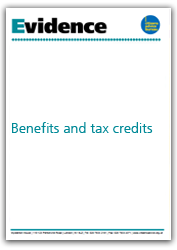Child benefit delays: The impact on CAB clients

Introduction
In 1999 the Labour Government committed itself to ending child poverty, pledging to halve it by 2010 and eradicate it by 2020.1 600,000 children were lifted out of poverty between 1998/9 and 2006/07, but the figure slipped back in 2007/08 – the latest year for which figures are available.2 Child benefit was a key tool in the initial drive to achieve the target, with a 20% increase in the rate of child benefit implemented in 1999. More recently, the Government has changed the housing and council tax benefit rules to disregard child benefit in the calculation of income. This means that low-income families in work will be an average of £20 per week better off. The latest rise in child benefit was brought forward three months ‘to reinforce the Government’s commitment to Child Benefit as the foundation of financial support for all families’.3 As a universal benefit, it has always had an almost full take up rate – estimated at 98 per cent in 2006.4 Child benefit brings many families above the poverty line and provides evidence of care of a child, which is needed in order to receive income support and their full entitlement of housing benefit.
Child benefit is worth £20 for the oldest child and £13.20 for other children. The calculation below shows the income of a lone parent with two children in receipt of benefits. It shows that child benefit makes up around 17 per cent of the household income.
Income support: £64.30
Child tax credit: £96.44
Child benefit: £33.20
Total: £193.94
As a universal benefit it is one of the simplest to deliver and historically, Citizens Advice has seen very few enquiries about child benefit. However, over the last 18 months bureaux have seen increasing numbers of clients experiencing long delays getting their claims processed. These delays are impairing the potential of child benefit to boost family incomes and having a negative impact of the quality of children’s lives. Families most at risk of experiencing delays in their payments include those already vulnerable by recent separation from their partner, facing significant challenges as they adjust to their new family circumstances. For many families this waiting period causes serious financial problems not only because of the lack of child benefit money itself but the knock on impact on their ability to claim other key benefits such as income support.
This briefing describes the impact of delays on CAB clients and identifies the types of claims that are subject to the longest delays. It concludes with a set of recommendations.
1. The Government defines a child as in poverty if their parents’ income is 60% below the median income for the UK.
2. DWP 2009 Households Below Average Income
3. Explanatory memorandum to the child benefit (rates) (amendment) regulations 2008 www.hmrc.gov.uk/si/child-benefit-draft-em.pdf
4. House of Commons Hansard, Written Answers 7 March 2006, col 1296W.
Child benefit delays: the impact on CAB clients

